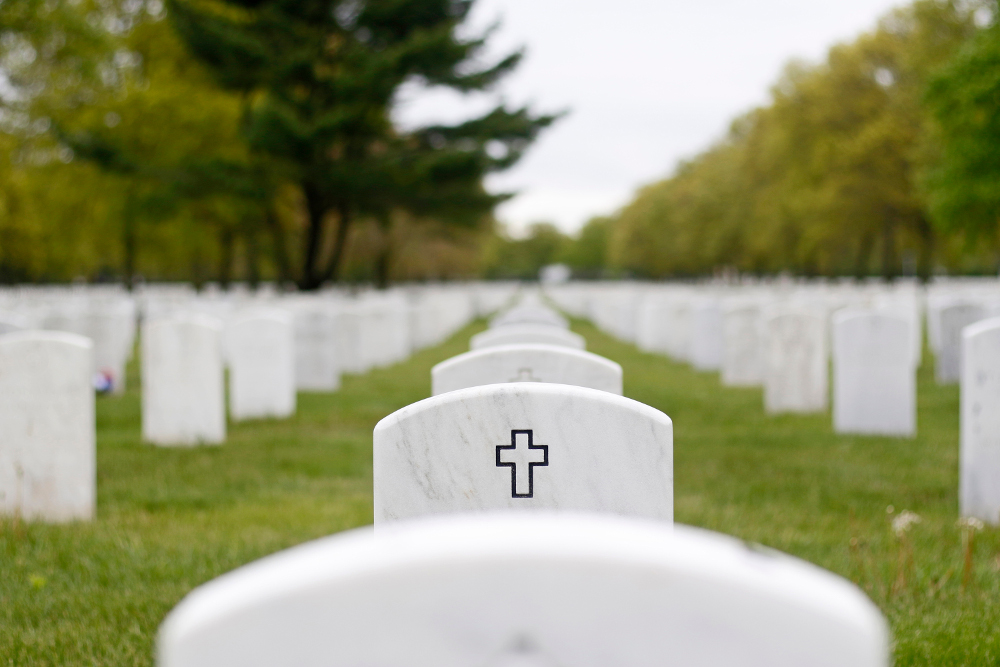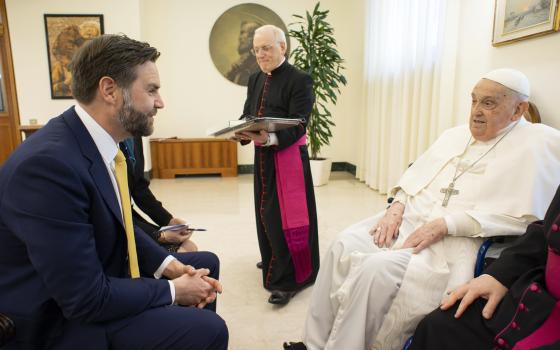
A cross marks a gravestone at Long Island National Cemetery on May 14 in Farmingdale, New York. (CNS/Gregory A. Shemitz)
Monday will be Memorial Day. Here in Connecticut, we have a parade down Main Street. It is a small and humble parade. The three or four floats are usually townsfolk on the back of a flatbed truck, dressed in period clothes for the Historical Society float or with a couple of farm animals for 4-H. The local high school marching band plays patriotic songs. The fire trucks bring up the rear. The parade starts at the Congregational Church and ends at the old elementary school, which was the last wooden schoolhouse in use in Connecticut when I attended it.
At the head of the parade, and honored at the brief ceremony, are our town's veterans. After all, it is not any memory we celebrate this weekend, but the memory of those men and women who went to war on behalf of the nation. Growing up, our little town still had a couple of World War I veterans, quite a few World War II veterans, men like my Dad who served in Korea, and some young men who had recently returned from Vietnam. Now the young veterans include women, and they have served in Afghanistan or Iraq.
Whatever we think of the wars in which they fought, it is good to honor the selflessness of their service. When you walk through a national military cemetery like that at Arlington, or at Gettysburg, or the many located in France, you get some sense of the scale of war's carnage and it can be overwhelming. When I lived in Washington, I tried to visit some of the nearby Civil War battlefields and the numbers of those killed or wounded always astounded. There were 22,720 casualties — killed, wounded, missing or captured — at the Battle of Antietam. More Americans died that day than any other in our history. If you learn about the medical practices of the time, or the conditions at prison camps, you know the dead were the lucky ones.
When I would bring visitors to Gettysburg, the battlefield I came to know the best, I would always take them to what was the far end of the Union Left on the second day of battle, the woods on Little Round Top. As soon as you come through the trees, you instantly grasp the strategic significance of the spot: Had the Confederate troops placed cannon on Little Round Top, they would have outflanked the entire Union line stretched out along Cemetery Ridge to the center of town. We all now know about the 20th Maine from the 1993 movie "Gettysburg," and subsequent accounts. The thing I always tried to impress upon my guests was this: That the battle of Gettysburg was a close run thing.
We tend to look back at history and conclude that there was a certain inevitability to the way things turned out: We read histories which offer various interpretations of events, filled with statistics, and so we learn that the North had a huge preponderance in weaponry, manpower, and money, so of course they were bound to win. But battles are tricky things, they do not usually go as planned and all the resources in the world don't matter a whit unless they have been brought to bear at the right time and place. At every battlefield in every war, there was a decisive moment and a decisive spot, and while the generals may have employed their forces in such a way as to prepare the outcome, at that moment and in that place, it is the simple soldiers who rise to the occasion and decide the battle.
Those are the men and women we remember on Monday. On every grave at Arlington, or Normandy, or Luxembourg, there is a name. Generals move platoons or brigades but wars are fought by individual soldiers, with families and friends and hopes and dreams. Some of them were our neighbors and friends before they went off to war. It is good to remember them and to thank again those who served and returned home. Many of them carry psychological scars every bit as searing as anything sustained at Antietam or Gettysburg.
Advertisement
I hope someday there are no more new wars, producing new sacrifices by new veterans, that future generations will have no new tragedies they need to commemorate. Over the weekend, at cemeteries throughout the land, flags will be placed at the graves of veterans. It is a fitting tribute. It is an even more fitting tribute to pray for an end to war, to begin using our political power to disassemble the military-industrial complex President Dwight Eisenhower warned us about, to work on peace-building initiatives in our communities and in our country, to support diplomatic efforts around the globe to end strife by peaceful means.
In this vale of tears, however, the evil of hatred and war will never be entirely effaced and it is fitting that we remember the sacrifices of the soldiers. May the ones who did not return rest in peace and may those who did return be honored on this day. May the rest of us learn from their sacrifice that our liberties are indeed precious and that we human beings desperately need to find better ways to resolve our conflicts.
[Michael Sean Winters covers the nexus of religion and politics for NCR.]
Editor's note: Don't miss out on Michael Sean Winters' latest: Sign up and we'll let you know when he publishes new Distinctly Catholic columns.





